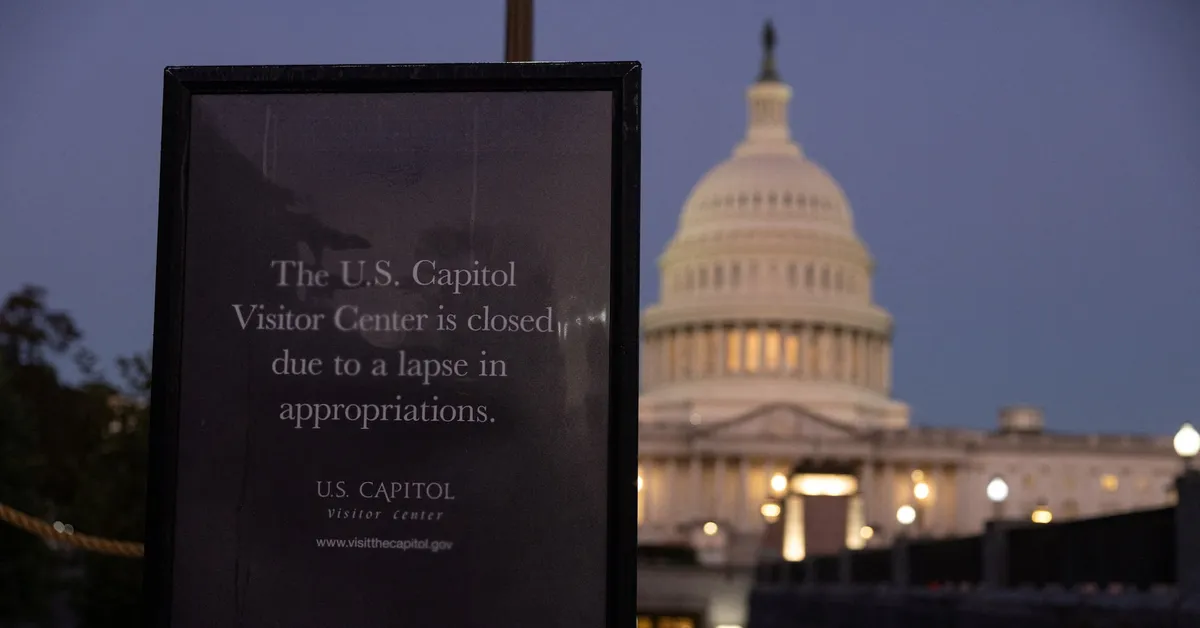
The Trump administration is intensifying its threats to lay off thousands of federal employees if Congress does not act to end the ongoing government shutdown. President Donald Trump addressed the media on Sunday night, claiming that layoffs were “taking place right now.” However, during a subsequent press briefing on Monday, White House Press Secretary Karoline Leavitt clarified that Trump was actually referencing the hundreds of thousands of federal employees who have been furloughed since the shutdown commenced on October 1.
Leavitt emphasized the financial strain that millions of federal workers are currently facing, stating, “They are under enormous financial stress as a result, wondering how they will pay their bills and take care of their families. If the Democrats do not vote to open the government tonight, federal workers will not receive their next full paycheck.” This stark warning heightens the urgency for Congress to find a resolution to the shutdown.
Last week, Leavitt stated that layoffs “in the thousands” were imminent. Additionally, Office of Management and Budget Director Russ Vought informed Republican lawmakers that such layoffs would occur in the coming days. During the Monday briefing, Leavitt reiterated that the OMB is actively collaborating with various agencies to determine which employees may face layoffs if the shutdown persists. Unfortunately, for the fifth consecutive time, the Senate failed to pass stopgap funding bills proposed by both Democrats and Republicans.
Leavitt expressed concern, stating, “We don’t want to see people laid off. But unfortunately, if this shutdown continues, layoffs are going to be an unfortunate consequence of that.” In response to the looming threat of mass layoffs, unions representing government employees have sought a federal judge's intervention to preemptively block the Trump administration from executing any mass layoffs during the shutdown.
In a surprising turn of events, one federal agency, the General Services Administration (GSA), is doing the opposite of laying off employees. Instead, they are reinstating hundreds of previously laid-off employees to manage its government-wide real estate portfolio. On Monday, the GSA brought back hundreds of employees to work after rescinding reduction-in-force notices that had been issued months prior. Reports from GSA employees indicate that the shutdown did not hinder the agency’s plans to reinstate these workers, who will continue to be paid on time during the lapse.
According to sources, the GSA intended to rescind RIFs for approximately 400 employees within the Public Buildings Service (PBS). An industry official noted that around 75% of PBS employees who were offered the option to return to work accepted the invitation. A spokesperson for the GSA directed further inquiries to the OMB regarding this decision.
The GSA's updated contingency plans reveal that more than 3,000 PBS employees will be exempt from the current shutdown, representing a significant portion of the overall PBS workforce. This exemption allows PBS employees to maintain normal operations, including timely payments and covering expenses, thanks to “no-year” funds that the agency can carry over from one fiscal year to the next.
The contingency plan states, “Because GSA is the government’s property manager, GSA personnel will be responsible for maintaining, protecting, and preserving that property to a greater extent than many other agencies.” It further emphasizes that exempt GSA employees must protect life and federal property and provide necessary support to other government agencies during this period.
Typically, during a government shutdown, federal buildings remain open for employees but may not be accessible to the public. GSA anticipates that it will be able to make rent payments for leased office spaces on time; however, entering into new leases will be impossible unless the project is already underway before the shutdown. Additionally, GSA’s initiatives to sell and dispose of underutilized federal buildings will be suspended during this period.
Under the Trump administration, the GSA has aimed to offload about 50% of its real estate portfolio. The contingency plan underscores the necessity of adequate staffing to manage federal assets, stating, “GSA’s role as an aggregator of government assets and a supplier of critical tools to other federal agencies requires that GSA retain adequate staffing under a lapse in appropriations.”
The Antideficiency Act restricts agencies from obligating funds during a lapse in congressional appropriations. However, many federal employees are exempt or excepted during a shutdown if their work is related to protecting human life or property. The Trump administration has pointed to the need to protect federal buildings as a rationale for deploying the National Guard in cities like Chicago and Portland.
Former PBS Commissioner Norman Dong noted in a January 2019 white paper that a brief shutdown would have a minimal impact on federal leasing, but a prolonged shutdown could severely disrupt the agency's ability to fulfill lease obligations. Dong warned that the government might have to take unprecedented measures to fund ongoing rent obligations to prevent significant operational disruptions.
As the GSA's contingency plans indicate, the number of exempt employees may dwindle as funds are exhausted, potentially leading to scenarios where exempt employees become “excepted,” which means they would continue reporting to work but not receive timely payments until the shutdown concludes.
In summary, the ongoing government shutdown poses significant challenges for federal employees, with the Trump administration's layoff threats creating heightened anxiety among workers. At the same time, the GSA's approach to reinstating employees and maintaining operations highlights a contrasting narrative during these uncertain times.